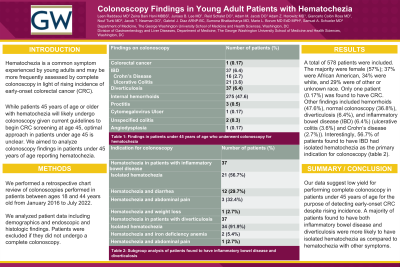Monday Poster Session
Category: Colon
P1583 - Colonoscopy Findings in Young Adult Patients With Hematochezia
Monday, October 23, 2023
10:30 AM - 4:15 PM PT
Location: Exhibit Hall

Has Audio
- LR
Leen Raddaoui, MD
George Washington University Hospital
Washington, DC
Presenting Author(s)
Leen Raddaoui, MD1, Zeina Bani Hani, MBBS1, Junseo B. Lee, MD2, Reid Schalet, DO1, Adam Jacob, DO1, Adam Horowitz, MD1, Giancarlo Rosa, MD1, Jacob T. Newman, DO3, Gabriel Diaz, ARNP1, Sumona Bhattacharya, MD1, Marie L. Borum, MD, EdD, MPH4, Samuel A. Schueler, MD1
1George Washington University Hospital, Washington, DC; 2George Washington University School of Medicine and Health Sciences, Washington, DC; 3George Washington University, Washington, DC; 4George Washington University Medical Center, Washington, DC
Introduction: Hematochezia is a common symptom experienced by young adults, and may be more frequently assessed by complete colonoscopy in light of rising incidence of early-onset colorectal cancer (CRC). While patients 45 years of age or older with hematochezia will likely undergo colonoscopy given current guidelines to begin CRC screening at age 45, optimal approach in patients under age 45 is unclear. We aimed to analyze colonoscopy findings in patients under 45 years of age reporting hematochezia.
Methods: We performed a retrospective chart review of colonoscopies performed in patients between ages 18 and 44 years old from January 2016 to July 2022. We analyzed patient data including demographics and endoscopic and histologic findings. Patients were included if hematochezia was an indication for colonoscopy and were excluded if they did not undergo a complete colonoscopy.
Results: A total of 578 patients were included. The majority were female (57%); 37% were African American, 34% were white, and 29% were of other or unknown race. Only one patient (0.17%) was found to have CRC. Other findings included hemorrhoids (47.6%), normal colonoscopy (36.8%), diverticulosis (6.4%), and inflammatory bowel disease (IBD) (6.4%) (ulcerative colitis (3.6%) and Crohn’s disease (2.7%)). Interestingly, 56.7% of patients found to have IBD had isolated hematochezia as the primary indication for colonoscopy.
Discussion: Our data suggest low yield for performing complete colonoscopy in patients under 45 years of age for the purpose of detecting early-onset CRC despite rising incidence. A majority of patients found to have both inflammatory bowel disease and diverticulosis were more likely to have isolated hematochezia as comparted to hematochezia with other symptoms.
Disclosures:
Leen Raddaoui, MD1, Zeina Bani Hani, MBBS1, Junseo B. Lee, MD2, Reid Schalet, DO1, Adam Jacob, DO1, Adam Horowitz, MD1, Giancarlo Rosa, MD1, Jacob T. Newman, DO3, Gabriel Diaz, ARNP1, Sumona Bhattacharya, MD1, Marie L. Borum, MD, EdD, MPH4, Samuel A. Schueler, MD1. P1583 - Colonoscopy Findings in Young Adult Patients With Hematochezia, ACG 2023 Annual Scientific Meeting Abstracts. Vancouver, BC, Canada: American College of Gastroenterology.
1George Washington University Hospital, Washington, DC; 2George Washington University School of Medicine and Health Sciences, Washington, DC; 3George Washington University, Washington, DC; 4George Washington University Medical Center, Washington, DC
Introduction: Hematochezia is a common symptom experienced by young adults, and may be more frequently assessed by complete colonoscopy in light of rising incidence of early-onset colorectal cancer (CRC). While patients 45 years of age or older with hematochezia will likely undergo colonoscopy given current guidelines to begin CRC screening at age 45, optimal approach in patients under age 45 is unclear. We aimed to analyze colonoscopy findings in patients under 45 years of age reporting hematochezia.
Methods: We performed a retrospective chart review of colonoscopies performed in patients between ages 18 and 44 years old from January 2016 to July 2022. We analyzed patient data including demographics and endoscopic and histologic findings. Patients were included if hematochezia was an indication for colonoscopy and were excluded if they did not undergo a complete colonoscopy.
Results: A total of 578 patients were included. The majority were female (57%); 37% were African American, 34% were white, and 29% were of other or unknown race. Only one patient (0.17%) was found to have CRC. Other findings included hemorrhoids (47.6%), normal colonoscopy (36.8%), diverticulosis (6.4%), and inflammatory bowel disease (IBD) (6.4%) (ulcerative colitis (3.6%) and Crohn’s disease (2.7%)). Interestingly, 56.7% of patients found to have IBD had isolated hematochezia as the primary indication for colonoscopy.
Discussion: Our data suggest low yield for performing complete colonoscopy in patients under 45 years of age for the purpose of detecting early-onset CRC despite rising incidence. A majority of patients found to have both inflammatory bowel disease and diverticulosis were more likely to have isolated hematochezia as comparted to hematochezia with other symptoms.
Disclosures:
Leen Raddaoui indicated no relevant financial relationships.
Zeina Bani Hani indicated no relevant financial relationships.
Junseo Lee indicated no relevant financial relationships.
Reid Schalet indicated no relevant financial relationships.
Adam Jacob indicated no relevant financial relationships.
Adam Horowitz indicated no relevant financial relationships.
Giancarlo Rosa indicated no relevant financial relationships.
Jacob Newman indicated no relevant financial relationships.
Gabriel Diaz indicated no relevant financial relationships.
Sumona Bhattacharya indicated no relevant financial relationships.
Marie Borum: Takeda – Advisory Committee/Board Member, Speakers Bureau.
Samuel Schueler indicated no relevant financial relationships.
Leen Raddaoui, MD1, Zeina Bani Hani, MBBS1, Junseo B. Lee, MD2, Reid Schalet, DO1, Adam Jacob, DO1, Adam Horowitz, MD1, Giancarlo Rosa, MD1, Jacob T. Newman, DO3, Gabriel Diaz, ARNP1, Sumona Bhattacharya, MD1, Marie L. Borum, MD, EdD, MPH4, Samuel A. Schueler, MD1. P1583 - Colonoscopy Findings in Young Adult Patients With Hematochezia, ACG 2023 Annual Scientific Meeting Abstracts. Vancouver, BC, Canada: American College of Gastroenterology.
